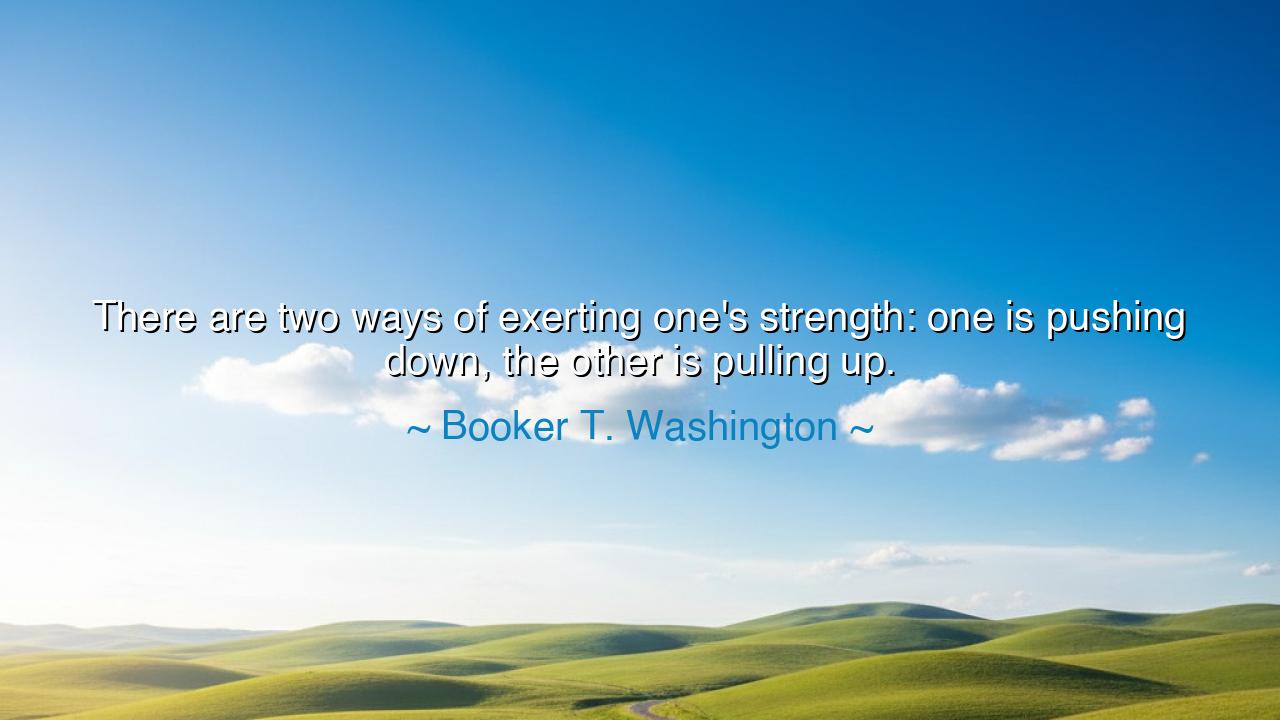
There are two ways of exerting one's strength: one is pushing
There are two ways of exerting one's strength: one is pushing down, the other is pulling up.






Booker T. Washington, born in bondage and rising to become one of the greatest teachers of freedom, once spoke with a clarity that pierces the ages: “There are two ways of exerting one’s strength: one is pushing down, the other is pulling up.” In this truth he revealed the eternal choice of power. Strength is given to every soul in some measure—whether of body, mind, or spirit—but the way one wields it determines destiny. To push others down is the path of tyranny and cruelty; to lift others up is the path of greatness and legacy.
The ancients, too, knew this law. In the myths of Greece, Heracles is remembered not only for slaying beasts but for using his might to cleanse cities, to protect the weak, to serve rather than to dominate. The difference between the tyrant and the hero was not the possession of strength, but the use of strength. The tyrant crushed; the hero lifted. Thus, Washington’s words echo a wisdom as old as civilization itself: power can degrade, or power can ennoble.
Consider Washington’s own life as testimony. Born a slave, he could have harbored bitterness, could have used his hard-won strength to strike against his oppressors. Instead, he chose the harder path: to lift his people through education, to build Tuskegee Institute, to teach that dignity and labor, skill and self-discipline, were the tools of true freedom. His strength did not push others down; it lifted up generations, transforming despair into possibility. In him we see his own teaching embodied: real strength is measured by how many are raised by it.
History gives us another example in Abraham Lincoln. In his presidency, he held immense power in a nation torn apart by war. He could have used his strength to crush the South with vengeance, to push down those who had rebelled. Yet after victory, he spoke instead of reconciliation, of binding wounds, of malice toward none and charity for all. His strength pulled up a broken nation, rather than pushing down a defeated enemy. This is the true measure of leadership: not destruction, but restoration.
To push others down is always the easier way. It requires no wisdom, no patience, no vision—only brute force and selfish will. But it leaves behind ashes, resentment, and chains. To pull others up demands far more: compassion, endurance, sacrifice, and vision. Yet it yields fruit that endures beyond the span of a single life. Tyrants are remembered in curses; lifters are remembered in blessings.
Washington’s wisdom is not merely for leaders and rulers—it is for each soul. In daily life, every act of speech, every choice of action, exerts strength in one way or the other. The sharp word may push another down; the kind word may lift them up. The selfish act may diminish another’s dignity; the generous act may restore it. Every human life is a chance to choose: will I use my strength to burden others, or to help them rise?
The lesson is clear: strength is not measured by domination but by service. The world is filled with those who push others down—through cruelty, arrogance, or neglect. But the noblest souls, the ones who shine across the centuries, are those who used their strength to lift others: teachers, healers, peacemakers, and visionaries. True greatness is not in how high you stand, but in how many you raise with you.
Practical action follows from this wisdom: Examine daily how you use your strength—your words, your influence, your resources. Choose to build rather than to break, to encourage rather than to mock, to share rather than to hoard. Lift one person each day, even if with only a kind word or small act of service. In time, the strength you use to lift others will become the foundation of your own enduring legacy. For as Booker T. Washington teaches, the highest use of strength is not in pushing down, but in pulling up.






AAdministratorAdministrator
Welcome, honored guests. Please leave a comment, we will respond soon